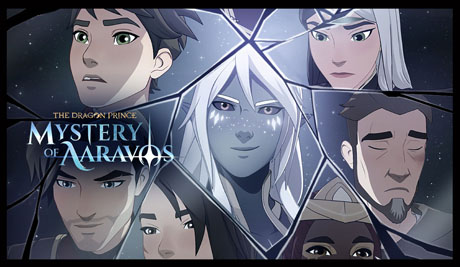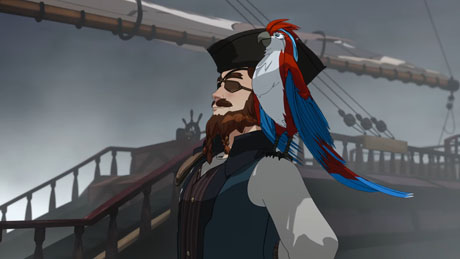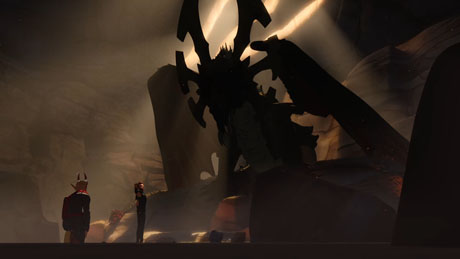
Fantasy stories are a means to convey ideas. Or with its characters, inspire directions for life. Or encourage new ways of thinking. Or expand the imagination. All from realms of make-believe. One can name Animal Farm, The Lord of the Rings, The Chronicles of Narnia, Alice’s Adventures in Wonderland, even The Hitchhiker’s Guide to the Galaxy in provoking the minds of their readers.
The Dragon Prince is no exception. It tackles subjects that some might find … challenging.

The show dares to portray villains with heart. Both Lord Viren and his daughter Claudia justify their foul deeds in the name of love.
It dares to tarnish its heroes. Ezran, for one, admittedly steals a man’s property, aided and abetted by his friends. The kid is a king, acting outside his jurisdiction! Has he no moral responsibility? He’s a role model! Not just to his subjects, but to viewers in the real world. His sticky fingers are first revealed in Episode One, where he pilfers jelly tarts from the royal kitchen.
It dares to advocate that religious superstition takes precedence over municipal public safety.
It dares suggest that cultural segregation may be preferable.
It dares to depict a blind character suffering from clinical depression and wishing for death.
It dares a viewpoint that some cultures might find abhorrent—which might hurt Netflix’s chances of selling the show in those areas of the world.
It dares tell stories that are dark, depressing, even brutal, with no guarantee of survival for the main characters.
This is gutsy storytelling.

Those wacky producers from Wonderstorm, July 21, 2023. Clockwise from bottom: Villads Spangsberg, Aaron Ehasz and Justin Richmond. Photo by W.R. Miller.
I spoke with the showrunners of The Dragon Prince about the topic, as well as an overview of Season Five, at the San Diego Comic-Con on July 21. Here are their thoughts.
“I’m going to start with some thanks to Netflix supporting a big epic show,” says co-creator Aaron Ehasz. “They’ve also been supportive of us dealing with themes we wanted to deal with, taking our characters on journeys we wanted to take them, representing characters and relationships that are less represented in media that reaches younger people. And that you’re talking about in some countries is restricted and younger people don’t get to watch it.
“But Netflix has been very supportive of us telling a complex story that has, as you put it, gutsy storytelling,” he says.
“I will tell you that Season Five started to push some of the edges of our rating and whether we could keep our rating everywhere. Season Six has probably gone beyond the pale, which is to say, we’ve had a conversation recently that was, ‘If you guys don’t pull these specific things back, it’s going to not be on the children’s accounts. The rating is gonna be too mature.’”
“Above Y7 basically,” co-creator Justin Richmond chimes in.
“It’s going to be too mature for younger accounts starting in Season Six,” Ehasz says. “And again, to their credit, they said, ‘Do what is creatively best and we will support you and put the show out to the audience that you’re trying to reach.’ And so we’ve allowed it to mature. Whatever you think has happened in Season Five, it’s getting pushed harder and harder. It goes beyond that in Season Six and Seven. And I think our audience is maturing and capable of grappling with the stories and stakes that we’re going to be delivering. That’s exciting.

“But yeah, to your point, you can’t do that without a partner that is open-minded enough to support your creative vision.”
Richmond adds, “Even in Season One through Three, they told us right away that there were some territories that even that content was not gonna be played in. And they were like, ‘We don’t care, we’re doing it. We’ll let you guys do it anyways.’”
They don’t do edits?
“They do,” Ehasz says. “They let us know and—”
“There are, sometimes. Yeah, that’s right,” Richmond says.
Ehasz points out, “They haven’t forced us to change anything. They advise us. They say, ‘This might cause the rating to change, this might do whatever’.”
I move on to the motivations of three of the show’s antagonists. While their intentions are known in Season Five, their motivations are still unclear. So I ask the showrunners to play the Mr. Morden Game. Morden, from Babylon 5, was the Rod Serling-type fellow who asked the ambassadors of the space station, “What do you want?” It was J. Michael Straczynski’s clever method of revealing the motivations of his characters, directly to the viewers.
What does Sol Regem the Sun Dragon want?
Ehasz answers, “Sol Regem has suffered some trauma that the audience doesn’t fully understand beyond even being blinded by a dark mage. And he struggles. Like, on some level, he wants it all to be over but he gets to live for thousands of years or however long because he’s an Archdragon. So Sol Regem has deep anger. He has anger at humanity and he has some trauma that you don’t know about yet.”
But what does he want? What would make him happy?
“Being dead,” Ehasz says.
Really? The poster star of the first three seasons wants to expire?
“I don’t know. I mean, maybe …”
“I’d say revenge a little bit,” Richmond says.
“It’s complicated,” Ehasz says. “Probably some revenge at some point. But I mean, he gives a speech, he’s depressed, he’s struggling, he’s bitter, he is angry. But he’s from the era where he was the Golden Sun King and he was a rising star. And, so, I [can’t say without spoilers]. We will learn more about Sol Regem’s past in Season Six, but not everything. But there were good times for him, once, and he feels on some level that he lost everything. Sorry, Bob, I know he’s your favorite. There’s more story here. He’s certainly the handsomest of the Archdragons. We can agree about that.”

What does Karim the Sunfire Elf want?
Richmond replies, “Karim wants to restore the Sunfire people to their rightful place in the universe. His point of view is that they had everything and they screwed it up. And he wants to go back to that place. And he thinks that the leadership has made a bunch of bad decisions and that if they went back to the old ways that things would be better.”
Do the old ways include eradicating mankind?
“Maybe not eradicating them, but certainly moving them. At least moving them farther away, if not killing them outright,” Richmond says. “Sol Regem and Sunfire elves have been very close for a very long time until Sol Regem was horribly disfigured and sort of was lost and forgotten and left to rot.”
So what does Aaravos want? Richmond leaves it to Ehasz to answer.
“That’s a great question,” Ehasz says. “It’s part of what is the mystery here, right? It’s part of what’s being unraveled, which is that he’s being punished for something and he was trying to do something. Right? On the one hand, he seems to uniquely support humanity, but he seems to be also open to the idea that they can use up dark magic and do things that undermine the elves and the dragons and the other magical creatures of Xadia. So is it that he really wants to support humanity or is it that he wants to undermine everybody else for some reason? And that’s starting to touch on what we see as his goals. But we’ll get to a lot more of that in Season Six and ultimately Season Seven.”
But what would make him happy?
“A nice plate of pie and some ice cream,” Richmond quips.
“Yeah,” Ehasz says.
Such is the Mystery of Aaravos, the subtitle of the final four seasons. In the main title, the Startouch Elf is depicted as a falling star—but there are other falling stars as well. As a storyboard artist, I take everything into account in the visuals. And so I ask, “Now, is that just a graphic element or are there more Startouch Elves invading the planet?”

“There’s more than one,” Ehasz reveals, “but we should talk about this in another season.
Ask us again when you’ve seen Season Six.”
Are there any rising stars?
“Not in the way that you’re talking,” Richmond replies. “Well, you know what? I don’t want to answer that question, either. It depends on how you would phrase it.”
“I think I know where you’re going, and so I don’t know. It’s complicated,” Ehasz says.
“Maybe. Ask us later,” Richmond says.
As for the current Season Five, of what is its importance to the overall saga?
Says Richmond, “I think you’re starting to see the turning of the screws, right? Things are starting to get more tense. Everything’s getting ramped up. So you’ve now got world-ending threats and all kinds of things in play now that were not at the beginning of Season Five. It’s just a huge scale difference, I think, between Season Four and Season Five.”
Executive producer Villads Spangsberg notes, “The clock is ticking in Season Five. We have plenty of room to keep building. Four was happy being back in the universe. Five is like, now the adventure really begins.”
Aaron Ehasz says, “Also, if you pay attention to Viren’s story arc and what happens to Viren, what I want people to know is Jason Simpson did something. Sorry, Jason, you know what you did. (Richmond laughs.) Don’t mess with the writers or that’s what happens.”
“Yeah,” Spangsberg says.
What did Jason Simpson do? The Dragon Prince showrunners didn’t explain, instead leaving to another scheduled interview, and adding another mystery to the Mystery of Aaravos.
What can I say?
To be continued.
Special thanks to Jennifer Greene of Illuminate-Communications.
A day after this interview, at Comic-Con, a Dragon Prince panel announced Netflix would release all of Season Five that very moment, June 22, five days ahead of schedule. Season Six’s premiere has yet to be announced.
- INTERVIEW: Aaron Ehasz, Justin Richmond on “The Dragon Prince: Mystery of Aaravos”: The Right Choice for the Voice - March 20, 2024
- INTERVIEW: “The Dragon Prince” Influences, Inspirations, and the Mystery of Simpson - March 11, 2024
- INTERVIEW: The Magic of Her Voice: Paula Burrows of “The Dragon Prince” - October 4, 2023


 September 1st, 2023
September 1st, 2023  W.R. Miller
W.R. Miller  Posted in
Posted in  Tags:
Tags: 






